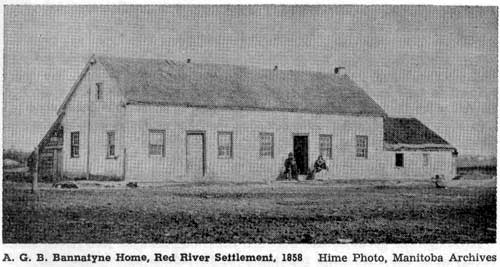Manitoba Pageant, Autumn 1965, Volume 11, Number 1
|
From The Nor'Wester, 22 January 1869:
When men hear that the inhabitants of a country, which produces under even ordinary circumstances, forty bushels of wheat to the acre, are in the midst of a scarcity, which borders on famine, they naturally argue, that, underlying this assumption of rich productiveness, there are drawbacks, which from carelessness or design, have been withheld, "why is it" may be very properly asked, that, when a man gives to the ground one bushel and receives back twenty, there are not large reserves of grain? How is it in a country with no market that grain does not accumulate? Why, the mere instinct of self preservation, does not induce the farmers to lay up for a rainy day? These are questions which may, and doubtless do, occur to every Canadian who is solicited for aid to our relief fund, and they doubtless have a double weight with those who turn their eyes westward for prairie homes. Unpleasant as the answer to these quotations may be to many of our people holding farms here, yet, in fairness to the Canadian people, in justice even to ourselves, we must endeavor to explain this apparent anamoly, and show that this vast country of lawn and meadows, of forest and plain, is the cornpletement of the advantages enjoyed by the people of Canada, as it is physically the keystone of the Dominion arch to the Pacific.
The kernel of the difficulty lies in the fact, that, on the best farming lands, we have not got a farming community. There are of course to this general fact many exceptions, and in all such exceptional cases, there is even in this time of scarcity, a comparative plenty; but unfortunately the large bulk of our population are not farmers. Hitherto immense herds of buffalo in our vicinity, the abundance of fish, fowl and rabbits in our midst have caused men, whose fathers hunted, fished and trapped for a subsistence, to follow in their footsteps, and what was at one time simply the sport of their youth, have become the vocations of their manhood.
This class, a very large one, although holding some of the finest lands in the settlement, make no other use of them than the cultivation of a small potato patch and possibly a few bushels of wheat sowed beside.
Years ago when the want of market was a fact, and not as it is at present, a fable, this plan answered well enough. The Lords and Sovereigns of the soil, did not require the soil tilled so much as they wanted the muskrat hunted. Every attempt at raising domestic cattle made this people less dependent of the flesh of the buffalo, and if the buffalo were not hunted, where were the robes to come from, that got the gold that filled the pockets, that swelled the wealth, of owners of this rotten fabric that Prince Rupert built.
Any attempt to make farmers out of this material will fail, because men do not easily quit the grooves in which their existence has been running and this time of scarcity clearly shows that the buffalo driven westward by the encroachment of settlement, by the intrusion of U.S. Military Posts, will stay there and that this people, this large proportion of our present population, will have to leave this settlement and follow them.

A. G. B. Bannatyne home, Red River Settlement, 1868, Hime photo.
Source: Archives of Manitoba
We may take it then for granted that a large number of such, having no seed to put in the ground, having killed their working cattle for food and retaining yet only their buffalo running horses, will sell their places for what they can and move westward. "What is one man's meat, is another man's poison," and the truth of this old saying, will be exemplified here this year. Never was there a time when this country presented so many inducements to the immigrants. Let immigrants come in early enough in the spring and bring good sound Canadian seed grain with them, and we can safely promise them the purchase of lots with houses, stables, land broken and fenced, for a merely nominal price, and we can as safely assure a ready cash market for all the grain they can raise and at least double the ordinary prices in Western Ontario. And we can promise too, what we look upon as a greater boon still, whether the negotiations fail in England or not, that another year will not see us under the hated rule of the Honorable H.B.Co.
Page revised: 18 July 2009